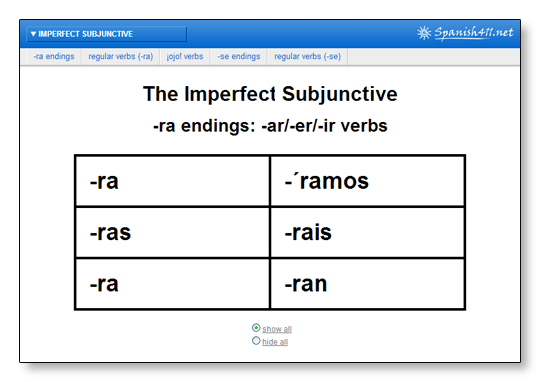|
|||||||||||||||||||||||||||||||||||||||||||||||||||||||||||||||||||||||
 |
|||||||||||||||||||||||||||||||||||||||||||||||||||||||||||||||||||||||
 |
|||||||||||||||||||||||||||||||||||||||||||||||||||||||||||||||||||||||
The Imperfect (Past) Subjunctive: How?
See also: The Imperfect Subjunctive: When? Here’s what you need to know to conjugate the subjunctive mood in the past tense: Regular Imperfect Subjunctive VerbsHow do we form the imperfect subjunctive? Similar to the present subjunctive, we’re going to do something that seems a little odd. The first step is to conjugate in the third person plural (ellos/ellas/Uds.) preterite indicative. Don’t remember the third person plural preterite indicative? Here’s a reminder: Note: In addition to the hablar:
comer:
vivir:
Next, we drop the habla- And then we add these endings: “-ar” / “-er” / “-ir” endings:
That’s
not a typo on the nosotros form. Once you conjugate in the ellos/ellas/Uds. form and drop the Here’s what you get if you follow the steps correctly: hablar:
comer:
vivir:
And here are some examples: viajar → viajaron→ viaja-Me alegré que ella viajara a
otros países. correr → corrieron → corrie-Esperábamos
que tú corrieras rápidamente. escribir → escribieron → escribie-Ellos
dudaban que escribiéramos novelas. Irregular Imperfect Subjunctive Verbs?The good news: technically speaking, there are no irregular imperfect subjunctive conjugations. The conjugation rule is consistently applied to every verb. The bad news: as you may recall, there are many irregular preterite conjugations. Since the preterite conjugations are the basis of the imperfect subjunctive there are a few issues worth reviewing: spelling changes, “-ir” stem changing verbs, and irregulars in the preterite. Note: For a complete listing of preterite irregulars, be sure to review The Preterite Tense and pay special attention to the ellos/ellas/Uds. forms. Some examples: leer → leyeron → leye-El
maestro quería que leyéramos el capítulo siete. dormir → durmieron → durmie-Nos
sorprendió que ella durmiera tanto. estar → estuvieron → estuvie-Me molestaba que ellas
estuvieran allí todos los días.  Let’s practice! Conjugate imperfect subjunctive verbs on ¡Practiquemos! Imperfect Subjunctive “-se” EndingsThey aren’t as widely used but there is another possible set of imperfect subjunctive endings that you may see or hear in Spanish. The verbs are conjugated in exactly the same way; only the endings are different. These conjugations mean the same thing; it’s completely up to you which form to use but you’re more likely to be understood with the “-ra” forms. Here are the “-se” endings, and the verb hablar conjugated with both the “-ra” endings and the “-se” endings for the sake of comparison: “-se” endings:
hablar (“-ra”):
hablar (“-se”):
|
|||||||||||||||||||||||||||||||||||||||||||||||||||||||||||||||||||||||
 This work by Spanish411.net is licensed under a Creative Commons Attribution-NonCommercial-ShareAlike 4.0 International License. This work by Spanish411.net is licensed under a Creative Commons Attribution-NonCommercial-ShareAlike 4.0 International License. |


